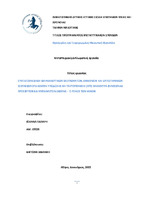| dc.contributor.advisor | Vivilaki, Victoria | |
| dc.contributor.author | Πάπαρη, Ιωάννα | |
| dc.date.accessioned | 2022-02-24T10:30:55Z | |
| dc.date.issued | 2022-01-13 | |
| dc.identifier.uri | https://polynoe.lib.uniwa.gr/xmlui/handle/11400/1763 | |
| dc.identifier.uri | http://dx.doi.org/10.26265/polynoe-1614 | |
| dc.description.abstract | Εισαγωγή
Τις τελευταίες δεκαετίες στην Ελλάδα η ηλεκτρονική συνταγογράφηση
αποτελεί ένα σημαντικό εργαλείο. Όσο αφορά τις μαίες η συνταγογράφηση είναι
υποχρεωτική σύμφωνα και με τις ισχύουσες διατάξεις του Προεδρικού Διατάγματος
351/1989, παρόλα αυτά ο νόμος αυτός όμως δεν εφαρμόζεται στην κλινική πράξη.
Σκοπός
Μελετήθηκε το επίπεδο γνώσεων των μαιών σε σχέση με την
συνταγογράφηση φαρμάκων, εμβολίων και διαγνωστικών εξετάσεων. Πιο
συγκεκριμένα, διερευνήθηκαν οι στάσεις και οι γνώσεις των μαιών αναφορικά με
την ηλεκτρονική συνταγογράφηση στα Κέντρα Υποδοχής και Ταυτοποίησης και στα
Κέντρα Φιλοξενίας Προσφύγων -Μεταναστών.
Υλικό- Μέθοδος
Στο ερωτηματολόγιο συμμετείχαν το 95,6% των μαιών που εργάζονται στα
Κέντρα Υποδοχής και Ταυτοποίησης και στα Κέντρα Φιλοξενίας Προσφύγων
Μεταναστών για το πρόγραμμα «Ολοκληρωμένη επείγουσα παρέμβαση υγείας για
την προσφυγική κρίση» του Ε.Ο.Δ.Υ. To ερωτηματολόγιο περιλάμβανε ερωτήσεις
γνώσεων, στάσεων αναφορικά με την συνταγογράφηση φαρμάκων, εμβολίων και
διαγνωστικών εξετάσεων.
Αποτελέσματα
Το 55,8 % των μαιών που συμμετείχαν στην έρευνα είχαν επαγγελματική
εμπειρία 1-5 έτη. 69,8% των μαιών απάντησε σωστά στις ερωτήσεις γνώσεων για τα
φαρμακευτικά σκευάσματα, ενώ το 58,1% δήλωσε ότι στα πλαίσια της
φαρμακοεπαγρύπνησης είναι αρκετά πιθανό να αναζητήσουν πληροφορίες για τις
παρενέργειες των φαρμακευτικών σκευασμάτων κατά την περιγεννητική περίοδο
στο διαδίκτυο. 97,7% συστήνουν στις μετανάστριες τις προβλεπόμενες εξετάσεις,
ενώ 53,5% των μαιών συστήνουν τα απαιτούμενα εμβόλια για την περιγεννητική
περίοδο. Η επιθυμία για πρόσβαση σε υπηρεσίες ηλεκτρονικής συνταγογράφησης
φαρμάκων (46,5%) και διαγνωστικών εξετάσεων (58,6%) σχετίζεται σημαντικά (P <
0,001) με τις γνώσεις και τις στάσεις για τη συνταγογράφηση. Η συμμόρφωση των
προσφύγων-μεταναστριών με την λήψη των συνταγογραφούμενων φαρμακευτικών
σκευασμάτων (p 0,010) και εμβολίων (p 0.004), σχετίζεται σημαντικά με τη
επιθυμία συνταγογράφησης από τις μαίες, όμως δεν σχετίζεται σημαντικά με τη
γνώση των μαιών για τα φάρμακα (P 0.435), τις διαγνωστικές και εργαστηριακές
εξετάσεις (P 0.692) και τα εμβόλια (P 0.332).
Συμπέρασμα
Αποτελεί σημαντικό στρατηγικό στόχο για την υγεία των μεταναστριών η
δυνατότητα εφαρμογής της ηλεκτρονικής συνταγογράφησης από τις μαίες στα
Κέντρα Υποδοχής και Ταυτοποίησης και τα Κέντρα Φιλοξενίας προσφύγων και
μεταναστών, αφού η ηλεκτρονική συνταγογράφηση από τις μαίες θα μπορούσε να
βοηθήσει στη συμμόρφωση των προσφύγων – μεταναστριών γυναικών στη
φαρμακευτική αγωγή, τα εμβόλια και τις εργαστηριακές και τις διαγνωστικές
εξετάσεις. | el |
| dc.format.extent | 66 | el |
| dc.language.iso | el | el |
| dc.publisher | Πανεπιστήμιο Δυτικής Αττικής | el |
| dc.rights | Αναφορά Δημιουργού - Μη Εμπορική Χρήση - Παρόμοια Διανομή 4.0 Διεθνές | * |
| dc.rights | Attribution-NonCommercial-NoDerivatives 4.0 Διεθνές | * |
| dc.rights.uri | http://creativecommons.org/licenses/by-nc-nd/4.0/ | * |
| dc.subject | Ηλεκτρονική συνταγογράφηση | el |
| dc.subject | Πρόσφυγες | el |
| dc.subject | Μετανάστριες | el |
| dc.subject | Δομές προσφύγων | el |
| dc.subject | Κέντρα υποδοχής και ταυτοποίησης | el |
| dc.title | Συνταγογράφηση Φαρμακευτικών σκευασμάτων, εμβολίων και εργαστηριακών εξετάσεων στα Κέντρα Υποδοχής και Ταυτοποίησης (ΚΥΤ) και Κέντρα Φιλοξενίας Προσφύγων και Μεταναστών (ΚΦΠΜ) - Ο Ρόλος των Μαιών | el |
| dc.title.alternative | Perscription of pharmaceutical products, vaccines and laboratory exams in reception indetification centers (rics) and refugee camps | el |
| dc.type | Μεταπτυχιακή διπλωματική εργασία | el |
| dc.contributor.committee | Deltsidou, Anna | |
| dc.contributor.committee | Vivilaki, Victoria | |
| dc.contributor.committee | SARANTAKI, ANTIGONI | |
| dc.contributor.faculty | Σχολή Επιστημών Υγείας & Πρόνοιας | el |
| dc.contributor.department | Τμήμα Μαιευτικής | el |
| dc.contributor.master | Προηγμένη και Τεκμηριωμένη Μαιευτική Φροντίδα | el |
| dc.description.abstracttranslated | Introduction
During the past few decades the distant prescription has been an important
tool. As for the midwives it has been compulsory according to the existing provisions
of the applicable law of the Presidential decree 351/1989 but unfortunately it is not
applied in practice.
Purpose
The midwives’ educational level concerning the pharmaceutical products, the
laboratory exams and the vaccines was researched. More specifically the attitude
and the knowledge of midwives concerning the electronic prescription in the
Reception Identification Centers as well as the Refugee Camps for refugees and
immigrants was studied.
Research Tools and Methodology
The 95,6% of midwives who work in the Reception Identification Centers as
well as the Refugee Camps for refugees and immigrants in terms of the programme
“Fully urgent health care intervention” of National Public Health Organization
participated in the survey questionnaire. The questionnaire consists of knowledge
questions and questions related to their attitude towards the prescription of
pharmaceutical products, vaccines and laboratory exams.
Results
The 55,8% of midwives who participated in the research had working
experience which means between 1-5 years. The 69.8% of midwives responded
correctly to the knowledge questions concerning the pharmaceutical products while
the 58,1% claimed that in terms of pharmacovigilance it is highly possible that they
seek information about the side effects of pharmaceutical products during
pregnancy on the internet. 97,7% of them recommend that immigrants should
undergo the necessary laboratory exams while the 53,5% recommend the necessary
vaccines during pregnancy. Their willingness to have access to distant prescription
services of pharmaceutical products (46,5% ) and of laboratory exams (58,6%) is
associated (P 0.001) with their knowledge and their attitude towards the
prescription. The refugees’ and immigrants’ compliance with following the
prescribed medical treatments (p 0.010) and vaccinations (p 0.004) is closely
associated with the midwives’ willingness to prescribe them, however it is not
related to their knowledge on pharmaceutical products (P 0.435), laboratory exams
(P 0.692) and the vaccines (P 0.332) .
Conclusion
The possibility of distant prescription implementation by the midwives in the
Reception Identification Centers as well as the Refugee Camps for refugees and
immigrants is a strategically important target since distant prescription by midwives
could help towards the refugees’ and immigrants’ compliance with following
medication, undergoing vaccines and laboratory exams. | el |
| dcterms.embargoTerms | 6 months | el |
| dcterms.embargoLiftDate | 2022-08-26T10:30:55Z | |


